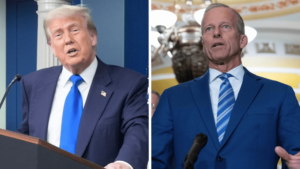Congress
White House eyes Kentucky state senator for Massie challenge
White House officials will host Kentucky state Sen. Aaron Reed in the coming weeks for a discussion about challenging GOP Rep. Thomas Massie in next year’s Republican primary, according to two people granted anonymity to describe the private plans.
President Donald Trump and his political operation have been searching for a candidate to challenge Massie over his opposition to the president’s “big, beautiful bill” and his strike on Iran’s nuclear facilities. Trump political advisers Chris LaCivita and pollster Tony Fabrizio have launched a super PAC directed at defeating Massie that’s already running a TV ad attacking the seven-term incumbent.
Massie is embracing the challenge, fundraising off MAGA’s slights and telling reporters last week he raised $120,000 in a single day off of Trump’s threats to campaign “really hard” against him.
Massie — who previously endorsed Reed for state Senate, and whom Reed in return had called “one of America’s greatest Congressmen” — did not immediately return a request for comment. Reed, a former Navy SEAL, was first elected to the Kentucky state house last year.
Congress
Republicans move forward with controversial megabill accounting move
Senate Republicans are on the cusp of formally adopting a controversial accounting tactic to zero out much of the cost of their massive domestic policy bill.
The matter came to a head on the Senate floor Sunday afternoon, when Democrats sought to prevent the use of the current policy baseline, as the tactic is known. Minority Leader Chuck Schumer objected to the maneuver and accused Republicans of setting a new precedent with the “budgetary gimmick.”
The Senate is set to vote on Schumer’s objection later Sunday or Monday, but Republicans believe their members will back up Senate Majority Leader John Thune and Senate Budget Chair Lindsey Graham.
That’s in part because they were able to sidestep a situation where senators would be asked to overrule Parliamentarian Elizabeth MacDonough on the baseline question. Instead, Republicans are asserting that Graham (R-S.C.) has the ability to establish which baseline is used under the 1974 law governing the budget process, rather than having MacDonough issue a formal ruling.
“There is nothing to debate and we consider this matter settled,” Graham spokesperson Taylor Reidy said.
The revised baseline allows Republicans to essentially write off the $3.8 trillion cost of extending tax cuts passed in 2017 that are set to expire at the end of the year. The effect on the megabill’s bottom line is profound as a pair of new Congressional Budget Office reports show.
One, released late Saturday night using the current policy baseline, showed the legislation would reduce the deficit by $508 billion. The other, released Sunday morning using the traditional method accounting for expiring provisions, showed the megabill would increase the deficit by $3.25 trillion.
“Things have never, never worked this way where one party so egregiously ignores precedent, process and the parliamentarian, and does that all in order to wipe away trillions of dollars in costs,” Sen. Patty Murray (D-Wash.) said during a speech on the Senate floor Sunday.
The maneuver came as little surprise. The GOP plan has been quietly in the works for months, and Thune had suggested they would reprise the no-formal-ruling strategy they’d used earlier in the process of passing the megabill.
“As we did on the budget resolution, we believe the law is clear that the budget committee chairman can determine the baseline we use,” Thune told reporters. Graham on Sunday embraced the CBO ruling showing the deficit savings — and his own authority to make the accounting change: “I’ve decided to use current policy when it comes to cutting taxes,” he said. “If you use current policy, they never expire.”
The baseline change is crucial for Senate Republicans because under the budget blueprint they adopted earlier this year, the Finance Committee provisions in the bill can only increase the deficit by a maximum of $1.5 trillion. The bill now under consideration wouldn’t comply under the old accounting method.
Sen. Ron Wyden (D-Ore.), the top Finance Democrat, called it “budget math as fake as Donald Trump’s tan” and said the GOP amounted to a “nuclear” choice that would weaken the chamber’s 60-vote filibuster.
“We’re now operating in a world where the filibuster applies to Democrats but not to Republicans, and that’s simply unsustainable given the triage that’ll be required whenever the Trump era finally ends,” he said.
Congress
Megabill reading wraps up after nearly 16 hours
Senate clerks have completed a nearly 16-hour reading of the GOP’s 940-page megabill. Clerks began reading the text aloud at 11:08 p.m. Saturday and finished Sunday at 3:03 p.m.
By refusing to waive chamber rules allowing for reading, Senate Democrats hoped to create an opportunity to highlight some of the most unpopular issues in the legislation. Now, under Senate rules, there will be 20 hours of the debate evenly divided between Democrats and Republicans.
Democrats are expected to use their full 10 hours, while Republicans are expected to take only a couple hours. That would mean the vote-a-rama — a marathon series of amendment votes — will begin sometime early Monday morning, though senators could agree by unanimous consent to delay it.
The GOP megabill is by no means finalized. Party leaders continue to negotiate to tweak the bill in ways that will win 51 votes in the Senate while also garnering enough votes to pass in the House later this week without further modifications. Republicans also continue to deal with the chamber’s parliamentarian, who continues to review whether parts of the bill comply with the budget rules the GOP is using to pass the bill along party lines.
Congress
Thom Tillis says he will retire following Trump attacks
Sen. Thom Tillis, a two-term North Carolina Republican who was expected to contest one of 2026’s toughest Senate races, said Sunday he will not seek re-election.
Tillis made the announcement after voting “no” on a procedural vote to advance President Donald Trump’s “big, beautiful bill” — the cornerstone of his domestic policy agenda. Trump subsequently attacked Tillis in a series of social media posts.
“In Washington over the last few years, it’s become increasingly evident that leaders who are willing to embrace bipartisanship, compromise, and demonstrate independent thinking are becoming an endangered species,“ Tillis said in a statement.
He continued: “As many of my colleagues have noticed over the last year, and at times even joked about, I haven’t exactly been excited about running for another term. That is true since the choice is between spending another six years navigating the political theatre and partisan gridlock in Washington or spending that time with the love of my life Susan, our two children, three beautiful grandchildren, and the rest of our extended family back home. It’s not a hard choice, and I will not be seeking re-election.”
Tillis’ retirement sets up what could be a wild and crowded GOP primary in the Tar Heel State. On the Democratic side, Rep. Wiley Nickel is already in the race, and national party leaders are hoping ex-Gov. Roy Cooper enters the race.
-

 The Josh Fourrier Show8 months ago
The Josh Fourrier Show8 months agoDOOMSDAY: Trump won, now what?
-
Uncategorized8 months ago
Bob Good to step down as Freedom Caucus chair this week
-

 Politics8 months ago
Politics8 months agoWhat 7 political experts will be watching at Tuesday’s debate
-

 Politics8 months ago
Politics8 months agoHow Republicans could foil Harris’ Supreme Court plans if she’s elected
-
Economy8 months ago
Fed moves to protect weakening job market with bold rate cut
-
Economy8 months ago
It’s still the economy: What TV ads tell us about each campaign’s closing message
-

 Politics8 months ago
Politics8 months agoRFK Jr.’s bid to take himself off swing state ballots may scramble mail-in voting
-
Uncategorized8 months ago
Johnson plans to bring House GOP short-term spending measure to House floor Wednesday






